新人教版初中英语八年级下册Unit2教案
人教版八下英语Unit2全单元教案
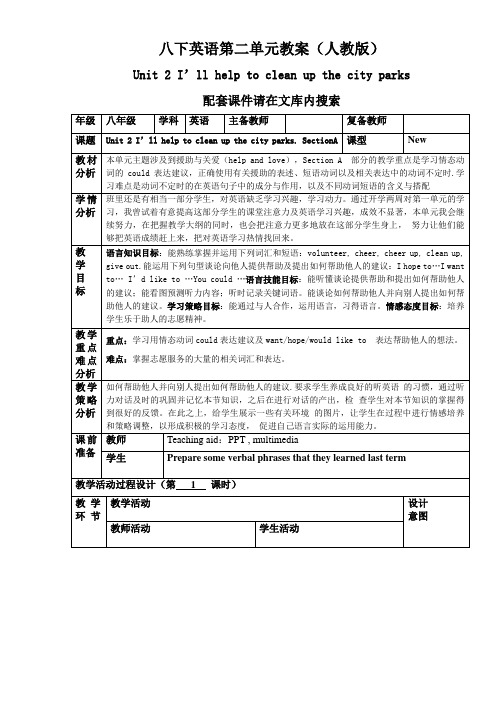
1.This weekend the Association of Susong Volunteer is going to have a volunteering activity. Here are the four activities.And each group of you will take part in one of the activities. But what could
学情分析
班里还是有相当一部分学生,对英语缺乏学习兴趣,学习动力。通过开学两周对第一单元的学习,我曾试着有意提高这部分学生的课堂注意力及英语学习兴趣,成效不显著,本单元我会继续努力,在把握教学大纲的同时,也会把注意力更多地放在这部分学生身上, 努力让他们能够把英语成绩赶上来,把对英语学习热情找回来。
教
学
目
标
语言知识目标:能熟练掌握并运用下列词汇和短语:volunteer, cheer, cheer up, clean up, give out.能运用下列句型谈论向他人提供帮助及提出如何帮助他人的建议:I hope to…I want to… I’d like to …You could …语言技能目标:能听懂谈论提供帮助和提出如何帮助他人的建议;能看图预测听力内容;听时记录关键词语。能谈论如何帮助他人并向别人提出如何帮助他人的建议。学习策略目标:能通过与人合作,运用语言,习得语言。情感态度目标:培养学生乐于助人的志愿精神。
Greet the teacher.
Get ready for the new lesson
ห้องสมุดไป่ตู้教学
环节
教学活动
设计
意图
To arouse Ss’ imagination and help them love their hometown better.
新人教版初中英语八年级下册Unit 2 教学设计
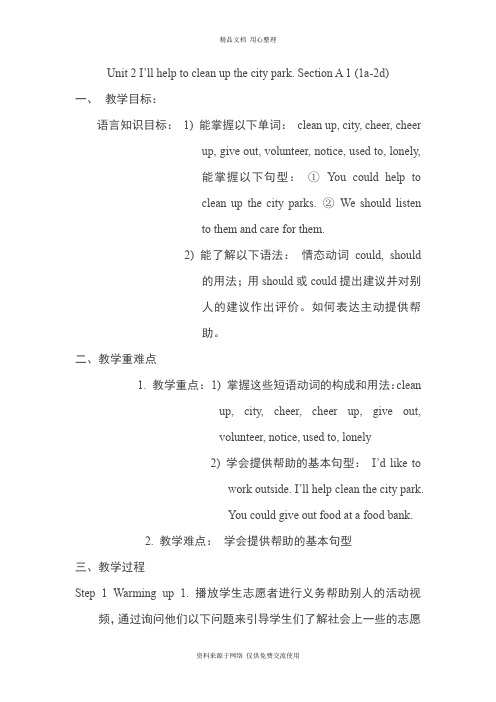
Unit 2 I’ll help to clean up the city park. Section A 1 (1a-2d)一、教学目标:语言知识目标:1) 能掌握以下单词:clean up, city, cheer, cheerup, give out, volunteer, notice, used to, lonely,能掌握以下句型:①You could help toclean up the city parks. ②We should listento them and care for them.2) 能了解以下语法:情态动词could, should的用法;用should或could提出建议并对别人的建议作出评价。
如何表达主动提供帮助。
二、教学重难点1. 教学重点:1) 掌握这些短语动词的构成和用法:cleanup, city, cheer, cheer up, give out,volunteer, notice, used to, lonely2) 学会提供帮助的基本句型:I’d like towork outside. I’ll help clean the city park.You could give out food at a food bank.2. 教学难点:学会提供帮助的基本句型三、教学过程Step 1 Warming up 1. 播放学生志愿者进行义务帮助别人的活动视频,通过询问他们以下问题来引导学生们了解社会上一些的志愿们进行的活动。
T: Who are they? S:They’re volunteers. They usually volunteer to help others. T: How could we help people? S1: We could clean up the parks S2: We could help sick people in the hospital. S3: We could help plant trees. …Step 2 New words 1. city n. 城市e.g. The library is in the north of the city. 图书馆在城市的北部。
人教版英语八年级下册Unit2SectionB(2a2e)教学设计

2.阅读理解:选取一篇与冒险相关的文章,设计5-10道阅读理解题,要求学生完成。问题类型包括细节理解、推理判断和主旨大意等,以检验学生对阅读策略的掌握。
-对于基础较好的学生,可以设置更具挑战性的任务,如撰写小短文或进行深入讨论。
4.阅读策略训练:通过指导学生预习、课堂讨论和课后复习,培养学生的阅读策略。
-在预习阶段,学生通过完成预测任务来激活背景知识。
-在课堂讨论中,引导学生通过问题解答和总结来加深对文本的理解。
-课后复习时,鼓励学生运用所学策略进行自我检测和提升。
人教版英语八年级下册Unit2SectionB(2a2e)教学设计
一、教学目标
(一)知识与技能
本章节主要是人教版英语八年级下册Unit 2 Section B(2a-2e)的内容,旨在帮助学生掌握以下知识与技能:
1.能够理解和运用与本单元主题相关的词汇和短语,如"adventure", "safety", "explore", "in case", "as well as"等。
5.听力技能培养:通过多样化的听力练习,如听对话、短文并完成相关任务,提高学生的听力技巧。
-设计梯度性的听力任务,从简单的信息捕捉到复杂的推理判断,逐步提升学生的听力能力。
6.情感态度培养:在教学过程中,注重学生情感态度的引导,鼓励他们勇敢面对挑战,培养团队合作精神。
人教版八年级英语下册Unit2教学设计

7.评价机制:采用多元化的评价方式,如自评、互评、教师评价等,关注学生的全面发展。
8.教学反思:在教学过程中,教师应不断反思和调整教学策略,以提高教学效果。
四、教学内容与过程
(一)导入新课
1.教学活动:教师展示一幅描绘成功人士的图片,引导学生观察并思考:“What does this picture remind you of? Can you guess who this person is?”
4.学生对于成功人士的故事有一定的兴趣,但可能对背后的努力和付出认识不足,需要教师引导他们正确看待成功,培养他们努力拼搏的精神。
5.学生在情感态度方面,部分学生对自己缺乏信心,容易受到挫折。教师在教学过程中应关注学生的情感需求,鼓励他们勇敢面对困难,树立自信心。
三、教学重难点和教学设想
(一)教学重难点
3.能够运用所学词汇和语法,进行简单的英文演讲和对话,提高英语口语表达能力。
4.能够阅读并理解关于成功人士的故事,提取关键信息,分析成功的原因。
5.掌握基本的写作技巧,如文章结构、过渡词的运用,能撰写一篇关于自己或他人成功经历的小短文。
(二)过程与方法
在本章节的教学过程中,学生将通过以下方法培养英语学习能力:
3.阅读作业:学生需阅读一篇关于成功人士的英文文章,并完成相关的阅读理解练习,如填空、选择、问答等。文章应选自可靠的英文资源,难度适中,以增加学生的阅读量,提高阅读理解能力。
目标:通过阅读拓展知识,增强学生对成功人士及其故事的理解,提高阅读分析能力。
4.小组作业:学生以小组为单位,共同探讨一个成功主题,如“努力与成功的关系”,“如何面对失败”等,并制作成PPT或海报,进行课堂展示。
人教版八年级英语下册Unit2单元整体说课稿

5.跨学科整合:结合地理、历史等学科知识,让学生更全面地了解旅游景点,提高学习兴趣。
三、教学方法与手段
(一)教学策略
在本节课中,我将采用以下主要教学方法:交际法、任务驱动法和情境教学法。
1.交际法:通过师生、生生之间的互动交流,让学生在实际语境中运用所学知识,提高口语表达能力。选择这一方法的理论依据是交际语言教学理论,认为语言学习应注重实际运用,强调语言的交际功能。
1.展示旅游图片:通过展示世界各地著名的旅游景点图片,让学生猜测景点名称和所在国家,激发他们的好奇心和求知欲。
2.引入话题:以“你最喜欢的旅游目的地是哪里?”为话题,让学生分享自己的旅游经历和感受,为新课的学习营造轻松愉快的氛围。
3.视频短片:播放一段关于旅游的短片,让学生在观看短片的过程中,感受旅游的乐趣,为新课内容做铺垫。
人教版八年级英语下册Unit2单元整体说课稿
一、教材分析
(一)内容概述
本节课为人教版八年级英语下册Unit 2的教学内容,主题为“旅游”。本单元在课程体系中的位置是继上册Unit 1“朋友”之后的第二个单元,旨在让学生在掌握基本英语语法和词汇的基础上,学会用英语描述旅游经历和表达对旅游的看法。
本单元主要知识点包括:一般过去时的被动语态、常用旅游词汇、描述旅游经历的句型以及阅读和听力技巧。具体来说,包括以下五个方面:
-描述旅游经历时,如何运用所学句型进行流畅的表达。
二、学情分析导
(一)学生特点
本节课面向的是八年级学生,这个年龄段的学生具有以下特点:好奇心强,对新鲜事物有较高的兴趣;思维活跃,具有一定的抽象思维能力;开始形成自己的价值观,对事物有自己的看法。在英语学习方面,他们的认知水平已达到能够理解和运用一般过去时,但对被动语态的掌握还较为生疏。此外,学生对旅游话题感兴趣,喜欢分享自己的经历,这为教学提供了良好的情感基础。在学习习惯上,部分学生自主学习能力较强,但仍需教师引导和督促。
人教版八年级下册英语Unit2SectionB(2a2e)教学设计

-针对学生的个体差异,给予个性化的指导,提高他们的自信心。
-对学习困难的学生,给予关注和鼓励,帮助他们克服困难,提高学习效果。
5.课后巩固,拓展提高:
-设计富有挑战性的课后作业,让学生在课后巩固所学知识。
-鼓励学生进行拓展阅读,了解更多优秀人物的品质,提高自身素养。
6.情感教育,培养价值观:
2.要求每组选择一个人物,用一般现在时态进行描述,并在组内分享。
3.鼓励学生互相提问、讨论,以提高口语表达能力和思维品质。
4.教师巡回指导,给予个性化的建议和指导,帮助学生提高讨论效果。
(四)课堂练习
课堂练习环节,教师将:
1.设计各种练习题,包括词汇填空、句型转换、阅读理解等,让学生巩固所学知识。
2.要求学生根据课文内容,用一般现在时态描述人物品质,提高写作能力。
2.学会使用一般现在时态描述人物的性格特点,如"He is always polite to others."。
3.能够理解并运用本节课所学的阅读策略,如预测、扫读、精读等,提高阅读理解能力。
4.能够通过小组合作,运用所学知识进行角色扮演,提高口语表达能力。
5.掌握如何用英语撰写人物描述,提高写作能力。
-在教学中融入情感教育,引导学生关注优秀人物品质,培养良好的道德观念。
-通过讨论、反思,帮助学生树立正确的人生观和价值观。
四、教学内容与过程
(一)导入新课
为了激发学生的学习兴趣,本节课将从以下方面导入新课:
1.利用多媒体展示不同国家和地区的人物图片,引导学生观察并讨论他们的性格特点。
2.邀请学生分享他们所了解的优秀人物及其品质,为新课的学习奠定基础。
二、学情分析
人教版初中八年级英语下册第二单元Unit2教案含教学反思

⼈教版初中⼋年级英语下册第⼆单元Unit2教案含教学反思Section A 单词cheer v.欢呼;喝彩volunteer v.义务做;⾃愿做n.志愿者sign n.标志;信号notice n.通知;通告;注意v.注意到;意识到lonely adj.孤独的;寂寞的several pron.⼏个;数个;⼀些strong adj.强烈的;强壮的feeling n.感觉;感触satisfaction n.满⾜;满意joy n.髙兴;愉快owner n.物主;主⼈journey n.(尤指长途)旅⾏;⾏程raise v.募集;征集alone adv.独⾃;单独midnight n.午夜;⼦夜短语clean up打扫(或清除)⼲净cheer up (使)变得更⾼兴;振奋起来give out分发;散发come up with想出;提出(主意、计划、回答等)put off推迟hand out 分发call up打电话给(某⼈);征召used to曾经……;过去……care for照顾;⾮常喜欢try out参加……选拔;试⽤句型1.They told me stories about the past and how things used to be.他们给我讲过去的⽣活经历,讲过去是什么样⼦的。
2.…but I want to learn more about how to care for animals.……但是我想更多地了解如何照料动物。
句型1.I’m sure you know that this group was set up to help disabled people like me.我确定你知道这个团体是为了帮助像我这样的残疾⼈⽽建⽴的。
2.You helped to make it possible for me to have Lucky.有了你的帮助,我才有可能拥有“幸运⼉”。
新人教版八年级英语下册Unit2-I'll-help-to-clean-up-the-city-parks教案
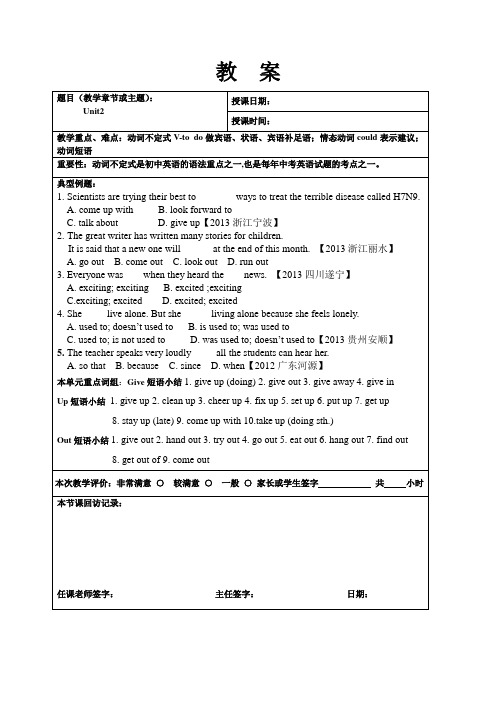
教案讲义学生:任课教师:例:Several boys were injured. 有几个小伙子伤了。
My friend speaks several languages. 我的朋友能讲几种语言11. Last year, she decided to try out for a volunteer after-school reading program.去年,她决定尝试在一个课后阅读项目中做一名志愿者。
【解析】try out 尝试;实验【拓展】try on 试穿①We should __________________(尽最大努力)to be happy in the future.②We should try ___ much fruit.A. eatB. to eatC. eatingD. eats12. care for sb./sth.照顾;照料care【名词】小心,关心;take care of = look after →【动词】care about sb./sth.关心,在意某人/事例:Many students in our school _______ the old and they usually offer their seats to them on buses. A.worry about B. care for C. agree with D. take care【拓展】care的短语总结take care =be careful v.当心,小心;take care of =look after v.照顾,照料,照看take care of 处理,做完练习:Thanks for your invitation, but I’m so sorry I can’t go. I need to ______ my baby at home. A. take away B. take off C. take care of D. take out of13. But I want to learn more about how to care for animals...但是我想学习更多的关于如何照顾动物的知识【解析】―疑问词+不定式‖作及物动词的宾语,【记】:I don’t know what to do.I don’t know how to do it. I don’t know what to do with it.【拓展】v+up with构成的短语:catch up with赶上;追上;put u with容忍;忍得住;keep up with 跟上;跟、保持联系end up with 结束;以.......而结束17.They told me stories about the past and how things used to be.他们给我讲过去的故事,并告诉我过去事情是什么样子的。
新人教版八年级英语下册Unit2 教学设计1
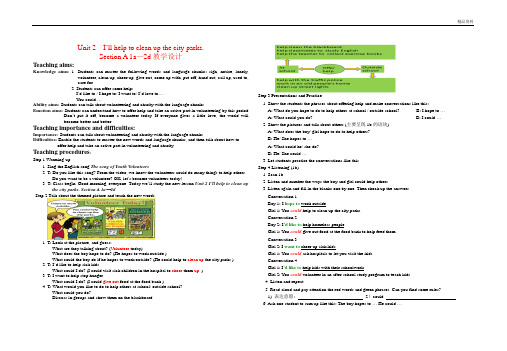
Unit 2 I’ll help to clean up the city parks.Section A 1a—2d教学设计Teaching aims:Knowledge aims: 1. Students can master the following words and language chunks: sign, notice, lonely, volunteer, clean up, cheer up, give out, come up with, put off, hand out, call up, used to,care for.2. Students can offer some help:I’d like to / I hope to/ I want to/ I’d love to…You could …Ability aims: Students can talk about volunteering and charity with the language chunks.Emotion aims: Students can understand how to offer help and take an active part in volunteering by this period.Don’t put it off, become a volunteer today. If everyone gives a little love, the world willbecome better and better.Teaching importance and difficulties:Importance: Students can talk about volunteering and charity with the language chunks.Difficulties: Enable the students to master the new words and language chunks, and then talk about how to offer help and take an active part in volunteering and charity.Teaching procedures:Step 1 Warming-up1. Sing the English song The song of Youth V olunteers2. T: Do you like this song? From the video, we know the volunteers could do many things to help others.Do you want to be a volunteer? OK, let’s become volunteers today!3. T: Class begin. Good morning, everyone. Today we’ll study the new lesson Unit 2 I’ll help to clean upthe city parks. Section A 1a—2dStep 2 Talk about the themed picture and teach the new words.1. T: Look at the picture, and guess:What are they talking about? (V olunteer today)What does the boy hope to do? (He hopes to work outside.)What could the boy do if he hopes to work outside? (He could help to clean up the city parks.)2. T: I’d like to help sick kids.What could I do? (I could visit sick children in the hospital to cheer them up. )3. T: I want to help stop hunger.What could I do? (I could give out food at the food bank.)4. T: What would you like to do to help others at school/ outside school?What could you do?Discuss in groups and show them on the blackboard. Step 3Presentations and Practice1. Show the students the phrases about offering help and make conversations like this:A: What do you hope to do to help others at school / outside school? B: I hope to …A: What could you do? B: I could …2. Show the pictures and talk about others (主要呈现1b的语块)A: What does the boy/ girl hope to do to help others?B: He/ She hopes to …A: What could he/ she do?B: He/ She could …3. Let students practice the conversations like this.Step 4Listening (1b)1. Scan 1b.2. Listen and number the ways the boy and girl could help others.3. Listen again and fill in the blanks one by one. Then check up the answers.Conversation 1Boy 1: I hope to work outside.Girl 1: You could help to clean up the city parks.Conversation 2Boy 2: I’d like to help homeless people.Girl 1: You could give out food at the food bank to help feed them.Conversation 3Girl 2: I want to cheer up sick kids.Girl 1: You could ask hospitals to let you visit the kids.Conversation 4Girl 1: I’d like to help kids with their schoolwork.Girl 2: You could volunteer in an after-school study program to teach kids.4. Listen and repeat.5. Read aloud and pay attention the red words and green phrases. Can you find some rules?1) 表达意愿:2)could6. Ask one student to sum up like this: The boy hopes to … He could …Step 5 Presentations and Practice1. Present the conversations.T: A group of students are planning a City Park Clean-Up Day. They need to come up with a plan to tell people about the city park clean-up. Clean-up Day is only two weeks from now. They can’t put off making a plan.—What could they do to tell people about it? —They could …put an ad on TV put up some signs call up some studentsput an ad in the newspaper hand out notices2. Let the students practice conversations according to language chunk packages.Step 6 Listening (2a, 2b)1. Play the tape for the Ss to listen and check(√): What are they going to do to tell people about it?2. Read the plans in 2b.3. Listen again and fill in the blanks.4. Listen again and check the answers.5. Listen and repeat, then read aloud.6. Make a conversation using the information in 2a and 2b.Step 7 Role-play conversation1. Show and talk about the picture.Who are they in the picture?Where are they going? (An old people’s home)What could we do? (They could read the newspaper to the old people./ …)How do lots of old people feel? (They are lonely.)What should we do? (We should listen to them and care for them./ …) 2. Ask the students to read the conversation and answer the questions.(1) What is Helen doing this summer?(2) When did Tom work in an old people’s home?(3) What did Tom help out with? And what did the old people tell Tom?(Teach: used to)(4) How do lots of old people feel about their life?(5) What should we do to help the old people? And why?3. Play the tape for the students to listen and imitate.4. The students read the dialogue loudly. (Read and look up)5. Check up by completing the conversations.(循序渐进的对话练习,为学生脱稿交流做准备)练习(1)Helen: Hi, Tom. I'm making some plans to work in an old people's home this summer.Tom: Really? I did that last summer!Helen: Oh, what did they ask you to help out with?Tom: Mm ... things like reading the newspaper to the old people, or just talking to them. They told me stories about the past and how things used to be.Helen: That sounds interesting.Tom: Yeah, a lot of old people are lonely. We should listen to them and care for them.Helen: You're right. I mean, we're all going to be old one day, too.练习(2)Helen: Hi, Tom. I'm making some plans to work in an old people's home this summer.Tom: Really? I did that last summer!Helen: Oh, what did they ask you to help out with?Tom: Mm ... things like reading the newspaper to the old people, or just talking to them. They told me stories about the past and how things used to be.Helen: That sounds interesting.Tom: Yeah, a lot of old people are lonely. We should listen to them and care for them.Helen: You're right. I mean, we're all going to be old one day, too.练习(3)Helen: Hi, Tom. I'm making some plans to work in an old people's home this summer.Tom: Really? I did that last summer!Helen: Oh, what did they ask you to help out with?Tom: Mm ... things like reading the newspaper to the old people, or just talking to them. They told me stories about the past and how things used to be.Helen: That sounds interesting.Tom: Yeah, a lot of old people are lonely. We should listen to them and care for them.Helen: You're right. I mean, we're all going to be old one day, too.6. Prepare for Role-play in groups. (脱稿)7. Rewrite the passage with the following questions of 2d.(1) Where did Tom go last summer?(2) What did Tom help out with? And what did the old people tell Tom?(3) What is Helen doing this summer? And what does she think of working for the old people?(4) How do lots of old people feel about their life?(5) What should we do to help the old people? And why?Step 8 Summary.How to talk about volunteering?Step 9 Writing1. T: Just now we talked about the volunteer work. Now I’ll show you others’ volunteer work. Pleaseenjoy and guess : What kinds of volunteer work could we do? (多媒体播放后,打开学生思维,让学生尽情表达。
人教版英语八年级下册Unit2大单元优秀教学案例

(二)过程与方法
1.学生通过预测、讨论、调查、角色扮演等活动,培养自己的合作意识和团队协作能力。在课堂上,学生将学会如何与他人共同探讨问题,分享观点,并进行有效的沟通。
2.学生将学会如何运用所学的语言知识进行问题解决和决策制定。通过各种教学活动,学生将培养自己的思维能力,学会分析问题、预测未来,并做出合理的判断。
3.学生将运用探究式学习方法,通过自主学习、合作学习和研究性学习,提高自己的学习能力和综合素质。学生将在教师的引导下,主动参与课堂活动,积极思考,培养创新精神和实践能力。
(三)情感态度与价值观
1.学生将培养对英语学习的兴趣和自信心,激发自己探索未来世界的欲望。通过学习Unit2,学生将对自己的未来充满希望,勇敢地追求自己的梦想。
3.通过情境创设,学生能够更好地理解和运用本单元所学的词汇和句型,提高自己的语言表达能力。同时,情境创设也有助于培养学生的创新思维和想象力,使他们对未来世界充满期待和向往。
(二)问题导向
1.在整个教学过程中,我将设计一系列问题,引导学生进行思考和探索。例如,我会在引入新课时提问:“你认为未来的世界会是什么样子?你希望能拥有哪些未来的科技产品?”激发学生的思考和讨论。
3.通过导入新课,学生能够激发对未来的想象和好奇心,对主题产生兴趣。同时,导入新课也有助于引导学生思考和探讨未来世界的科技发展,为后续的学习打下良好的基础。
(二)讲授新知
1.在讲授新知阶段,我会通过多媒体课件、例句和练习题等方式,向学生讲解一般将来时的被动语态。我会用生动的例句和实际情境,让学生理解和掌握“will be”结构的用法。
3.通过小组合作,学生能够培养自己的团队合作能力和交流沟通能力。同时,小组合作也有助于激发学生的学习兴趣和积极性,使他们更加主动地参与课堂学习。
人教版英语八年级下册Unit2大单元教学设计
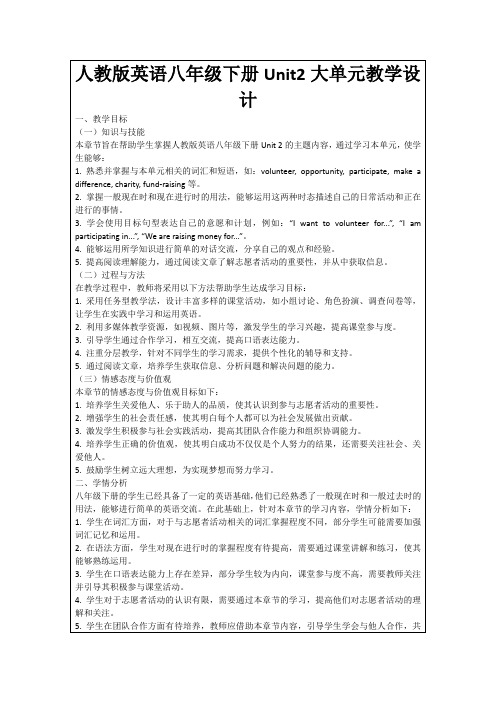
八年级下册的学生已经具备了一定的英语基础,他们已经熟悉了一般现在时和一般过去时的用法,能够进行简单的英语交流。在此基础上,针对本章节的学习内容,学情分析如下:
1.学生在词汇方面,对于与志愿者活动相关的词汇掌握程度不同,部分学生可能需要加强词汇记忆和运用。
2.在语法方面,学生对现在进行时的掌握程度有待提高,需要通过课堂讲解和练习,使其能够熟练运用。
4.鼓励学生互相批改练习,提高他们的自我纠错能力。
(五)总结归纳
1.教师引导学生回顾本节课所学内容,总结志愿者活动的意义和现在进行时的用法。
2.学生分享学习收获,教师给予肯定和鼓励,强调参与志愿者活动的重要性。
3.教师布置课后作业,要求学生运用所学知识描述自己参与志愿者活动的经历或计划,巩固课堂所学。
(三)学生小组讨论
1.教师将学生分成小组,要求每组讨论以下问题:What volunteer activities do you think are important in our community? Why? How can we participate in these activities?
3.学生在口语表达能力上存在差异,部分学生较为内向,课堂参与度不高,需要教师关注并引导其积极参与课堂活动。
4.学生对于志愿者活动的认识有限,需要通过本章节的学习,提高他们对志愿者活动的理解和关注。
5.学生在团队合作方面有待培养,教师应借助本章节内容,引导学生学会与他人合作,共同完成任务。
三、教学重难点和教学设想
5.教学评价方面,采用形成性评价和终结性评价相结合的方式,关注学生在学习过程中的表现,及时给予反馈和激励。
6.结合信息技术,利用网络资源、教育平台等辅助教学,提高学生的学习效果。
人教版英语八年级下册Unit2SectionB(2a2e)优秀教学案例

(二)讲授新知
1.教师呈现教材中的2a部分,让学生听录音并跟读,注意观察一般将来时态的用法。
2.教师引导学生关注一般将来时态的构成,如“will +动词原形”、“be going to +动词原形”,并举例说明。
(1)交际法:通过小组讨论、角色扮演等活动,培养学生运用英语进行真实情境交流的能力。
(2)任务型教学法:设计具有挑战性和实用性的任务,激发学生的学习兴趣和动机。
(3)启发式教学法:引导学生主动思考、发现问题,培养他们的思维品质。
(三)情感态度与价值观
1.情感态度:通过学习本节课,学生能够增强对英语学习的兴趣和自信心,形成积极的学习态度。教师关注学生的个体差异,鼓励他们积极参与课堂活动,培养合作精神和团队意识。
1.让学生谈论自己的周末计划,引导他们运用一般将来时态描述即将发生的事情。
2.创设一个关于旅行计划的情景,让学生在小组内讨论并制定旅行计划,用一般将来时态表达各自的想法。
(二)问题导向
教师以问题为导向,引导学生主动探究和学习。以下是一些建议的问题设计:
1.什么是一般将来时态?它与一般现在时态有什么区别?
2.价值观:教师引导学生认识到学习英语的重要性,激发他们树立远大的理想和目标。通过谈论未来计划,学生能够明确自己的发展方向,培养良好的时间管理和计划能力。
三、教学策略
(一)情景创设
为了让学生更好地理解和运用一般将来时态,教师需创设贴近学生生活的真实情景。通过呈现与未来计划相关的图片、视频等教学资源,让学生在具体语境中感知语言,激发他们的学习兴趣。同时,教师可以设计以下教学活动:
八年级英语下册Unit2教案(精选4篇)

八年级英语下册Unit2教案(精选4篇)八年级英语下册Unit2 篇1unit 8 topic 11. 1)so …that …如此…以至于….,that 引导的是结果状语从句,其结构是so +形容词或副词+that 从句。
2)so…that …可以换成such +(a/an)+形容词+名词。
2. would like 作为一个固定结构后接名词,代词,不定式作宾语,也可以用不定式作宾补,表示想要的意思。
1)would like sth. 想要某物;i would like some rice and pork 。
我想要一些米饭和猪肉。
2)would like to do sth. 想要做某事。
3)would like sb. to do sth. 想要某人做某事。
would like = want 想要1. be 为助动词,made 是及物动词make 的过去分词,of 后接宾语,be made of 的主语通常为成品。
be made from 后的原材料则看不出,be made in 主语是成品,介词in 后为产地,be made into 主语为原材料,介词into 后接成品。
the table is made of wood 。
这桌子是由木头制成的。
(可以看出原材料)paper is made from wood 。
纸是由木材制成的。
(看不出原材料)the comb is made in hong kong 。
这把梳子是香港制造的。
iron is made into knives 。
铁可以制成小刀。
2. afford 常接在can ,could ,be able to 之后,意为担负的起(…的费用,损失,后果等);抽的出(时间)。
afford 还有提供,给予,出产的意思。
3. on sale 上市;折价出售,减价出售。
for sale 待售,供出售。
7. (1)though 是从属连词,引导让步状语从句,和连词but 不能连用,但翻译时需译为但是。
新人教版初中英语八年级下册Unit2教案
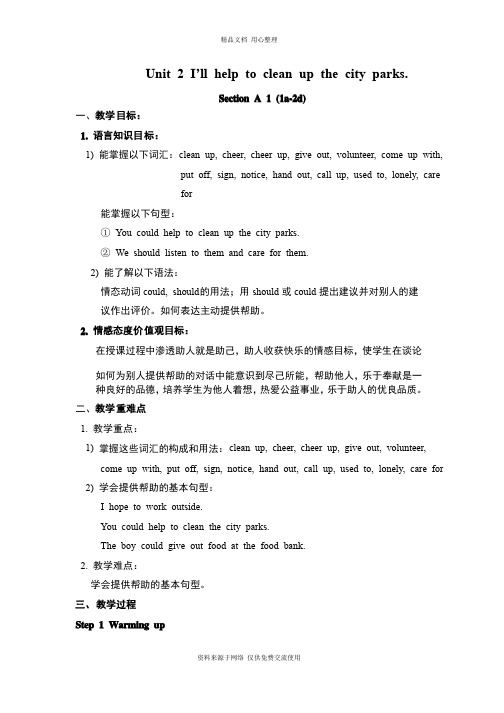
Unit 2 I’ll help to clean up the city parks.Section A 1 (1a-2d)一、教学目标:1. 语言知识目标:1) 能掌握以下词汇:clean up, cheer, cheer up, give out, volunteer, come up with, put off, sign, notice, hand out, call up, used to, lonely, care for 能掌握以下句型:① You could help to clean up the city parks. ② We should listen to them and care for them. 2) 能了解以下语法:情态动词could, should 的用法;用should 或could 提出建议并对别人的建议作出评价。
如何表达主动提供帮助。
2. 情感态度价值观目标:在授课过程中渗透助人就是助己,在授课过程中渗透助人就是助己,助人收获快乐的情感目标,助人收获快乐的情感目标,助人收获快乐的情感目标,使学生在谈论使学生在谈论如何为别人提供帮助的对话中能意识到尽己所能,如何为别人提供帮助的对话中能意识到尽己所能,帮助他人,帮助他人,乐于奉献是一种良好的品德,培养学生为他人着想,热爱公益事业,乐于助人的优良品质。
二、教学重难点m1. 教学重点:1) 掌握这些词汇的构成和用法:clean up, cheer, cheer up, give out, volunteer, come up with, put off, sign, notice, hand out, call up, used to, lonely, care for 2) 学会提供帮助的基本句型:I hope to work outside. You could help to clean the city parks. The boy could give out food at the food bank. 2. 教学难点:学会提供帮助的基本句型。
人教八年级下册英语Unit2教学设计
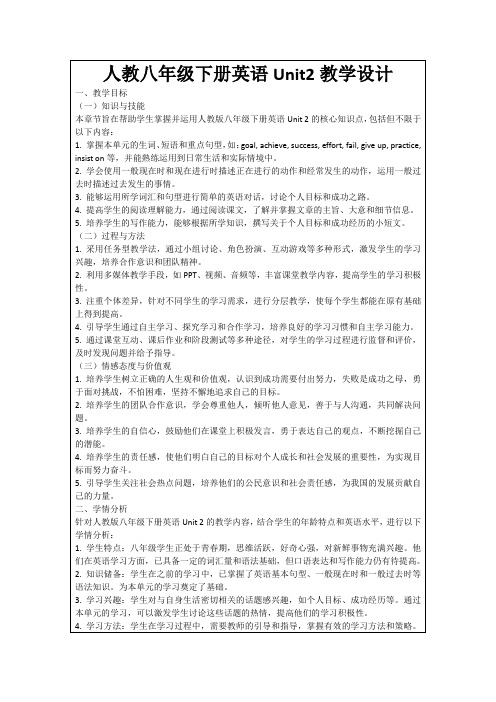
1.教学活动设计:
-教师提出讨论话题:“How to achieve your goals?”
-学生分成小组,进行讨论,分享各自的想法和经验。
2.教学实施:
-每个小组选出一个代表进行汇报,展示小组讨论成果。
-教师巡回指导,给予建议和鼓励,引导学生深入思考。
3.教学目的:
-培养学生的合作意识,提高他们的口语表达能力。
-建议学生进行课外阅读,拓宽知识面,提高阅读理解能力。
4.写作练习:根据本节课所学内容,以“我的目标”为主题,写一篇不少于80词的小短文。
-提供写作框架,帮助学生组织文章结构。
-鼓励学生运用所学词汇和句型,表达清晰、连贯。
5.口语练习:与家人或朋友进行英语对话,分享自己的目标及实现方法。
-教师提供话题参考,引导学生进行实际口语练习。
4.引导学生通过自主学习、探究学习和合作学习,培养良好的学习习惯和自主学习能力。
5.通过课堂互动、课后作业和阶段测试等多种途径,对学生的学习过程进行监督和评价,及时发现问题并给予指导。
(三)情感态度与价值观
1.培养学生树立正确的人生观和价值观,认识到成功需要付出努力,失败是成功之母,勇于面对挑战,不怕困难,坚持不懈地追求自己的目标。
(3)课后布置适量的作业,巩固所学知识,同时注重作业的反馈,及时了解学生的学习情况。
(4)开展课外活动,如英语角、英语演讲比赛等,为学生提供更多展示自己的机会,提高他们的英语实际应用能力。
3.教学评价:
(1)采用多元化的评价方式,如课堂表现、作业完成情况、阶段测试等,全面评估学生的学习效果。
(2)关注学生的个体差异,鼓励学生进行自我评价和同伴评价,培养他们的反思能力和合作精神。
英语人教版八年级下册Unit2PartA教学设计[五篇范文]
![英语人教版八年级下册Unit2PartA教学设计[五篇范文]](https://img.taocdn.com/s3/m/233e4431a200a6c30c22590102020740be1ecdd2.png)
英语人教版八年级下册Unit2PartA教学设计[五篇范文]第一篇:英语人教版八年级下册Unit 2 Part A 教学设计Unit 2 section A(3a-3c)教学设计教材分析:本单元的语言功能项目是“提供帮助”。
围绕“志愿活动和慈善事业”这一话题展开,Section A主要介绍单元基本语言内容,注重学生的听说能力和短语的积累。
教材通过谈论海报上帮助别人的方式导入本单元的重要句型和语法项目“动词不定式和用来表示建议的情态动词could”,然后通过听说训练落实这些语言项目。
学情分析:针对农村学生的英语基础较差,不断提高学生的学习兴趣的同时,上课还注意把握练习难度,对有问题的学生注意及时的给予帮助和鼓励。
【教学目标】Knowledge objective Get the students to be able to know the new words and expressions they learnt in this part Key words: several, feeling, satisfaction, joy, owner, journey 【教学重点】阅读短文,获得相关的信息。
通过阅读练习,来提高阅读能力。
【教学难点】理解并运用所学的词汇及表达方式【教学方法】PWP method, task-based method and interactive approach 【教学手段】A tape recorder, multimedia and some pictures 【教学过程】Teaching Procedures: Step 1 Warming up Watch a video and answer the questions.1.Where did they volunteer to work?2.What did they do there?3.What do you usually do on your free time? Would you like to volunteer to do anything for others?Ss try to answer the questions:1.They volunteered to work at the old people’s home.2.They made dumplings for the old people.They cleaned up their rooms.They talked with the old people.They sang and danced for the old people.… Step 2 Reading 1.3a:1.Tell Ss to read the article in 3a quickly and try to find the answers to these questions:(1)What does Mario love?(2)What does Mary love?(3)What do Mario and Mary volunteer to do? Ss read the article quickly and try to answer the questions: 2.方法指导:带着问题,然后快速阅读短文,争取在较短的时间内,找到答案。
新人教版八年级英语下册Unit 2 教案
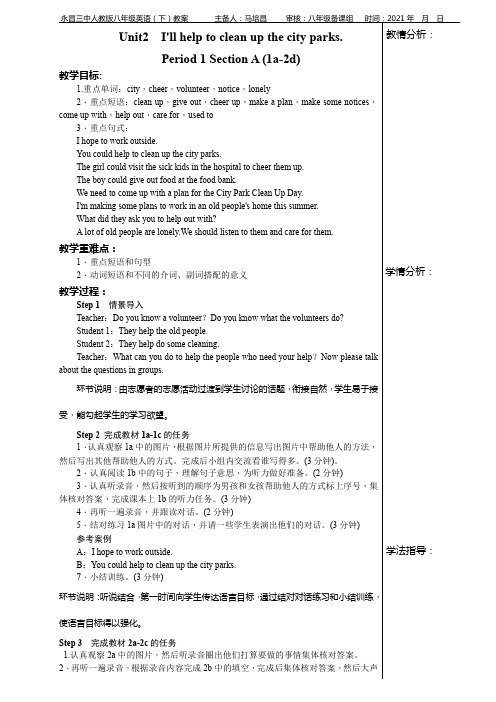
教情分析:学情分析: 学法指导:Unit2 I'll help to clean up the city parks.Period 1 Section A (1a-2d)教学目标:1.重点单词:city ,cheer ,volunteer ,notice ,lonely2.重点短语:clean up ,give out ,cheer up ,make a plan ,make some notices ,come up with ,help out ,care for ,used to3.重点句式:I hope to work outside.You could help to clean up the city parks.The girl could visit the sick kids in the hospital to cheer them up.The boy could give out food at the food bank.We need to come up with a plan for the City Park Clean Up Day.I'm making some plans to work in an old people's home this summer.What did they ask you to help out with?A lot of old people are lonely.We should listen to them and care for them. 教学重难点:1.重点短语和句型2.动词短语和不同的介词、副词搭配的意义 教学过程:Step 1 情景导入Teacher :Do you know a volunteer ?Do you know what the volunteers do?Student 1:They help the old people.Student 2:They help do some cleaning.Teacher :What can you do to help the people who need your help ?Now please talkabout the questions in groups.环节说明:由志愿者的志愿活动过渡到学生讨论的话题,衔接自然,学生易于接受,能勾起学生的学习欲望。
- 1、下载文档前请自行甄别文档内容的完整性,平台不提供额外的编辑、内容补充、找答案等附加服务。
- 2、"仅部分预览"的文档,不可在线预览部分如存在完整性等问题,可反馈申请退款(可完整预览的文档不适用该条件!)。
- 3、如文档侵犯您的权益,请联系客服反馈,我们会尽快为您处理(人工客服工作时间:9:00-18:30)。
Unit 2 I’ll help to clean up the city parks.Section A 1 (1a-2d)一、教学目标:1. 语言知识目标:1) 能掌握以下词汇:clean up, cheer, cheer up, give out, volunteer, come up with,put off, sign, notice, hand out, call up, used to, lonely, carefor能掌握以下句型:①You could help to clean up the city parks.②We should listen to them and care for them.2) 能了解以下语法:情态动词could, should的用法;用should或could提出建议并对别人的建议作出评价。
如何表达主动提供帮助。
2. 情感态度价值观目标:在授课过程中渗透助人就是助己,助人收获快乐的情感目标,使学生在谈论如何为别人提供帮助的对话中能意识到尽己所能,帮助他人,乐于奉献是一种良好的品德,培养学生为他人着想,热爱公益事业,乐于助人的优良品质。
二、教学重难点m1. 教学重点:1) 掌握这些词汇的构成和用法:clean up, cheer, cheer up, give out, volunteer,come up with, put off, sign, notice, hand out, call up, used to, lonely, care for2) 学会提供帮助的基本句型:I hope to work outside.You could help to clean the city parks.The boy could give out food at the food bank.2. 教学难点:学会提供帮助的基本句型。
三、教学过程Step 1 Warming up1. 播放学生志愿者进行义务帮助别人的活动视频,通过询问他们以下问题来引导学生们了解社会上一些的志愿们进行的活动。
T: Who are they?S:They’re volunteers. They usually volunteer to help others.T: How could we help people?S1: We could clean up the parksS2: We could help sick people in the hospital.S3: We could help plant trees.… Step 2 New words1. city n.城市e.g. The library is in the north of the city. 图书馆在城市的北部。
2. notice n.通知;通告;注意v. 注意到;意识到e.g. Please read the list on the notice board. 请读公告板上的名单。
3. sign n.标志;信号e.g. Look around, we could see no sign of life.环顾四围,我们看不出一点生命的迹象。
4. volunteer v.义务做,自愿做n.志愿者volunteer to do sth. 义务自愿做某事e.g. Many people volunteer to work on the farm. 很多人志愿到农场去工作。
5. clean up 打扫(或清除)干净e.g. The students take turns to clean up their classroom. 学生们轮流打扫教室。
6. give out 分发;散发请帮我将这些试卷发下去。
e.g. Please help me give out these test papers.7. cheer v.欢呼; 喝彩振作起来,消息还不算太坏。
e.g. Cheer up. The news isn’t too bad.8. lonely adj.孤独的;寂寞的e.g. I don’t feel lonely because I made new friends here.我不觉得孤独因为我交了新朋友。
9. used to 曾经……,过去…… 杰克过去很矮,但现在高了。
e.g. Jack used to be short, but now he’s tall.Step 3 Discussion1. 1a. Look at the ways you could help people in the pictures. Then list other ways.2. Ss discuss with their partners and write the ways one could help others:①Help plant trees by the river.②Help clean up the city park.③Visit the old people in the old people’s home.④Help young kids to learn English.Step 4 Listening1. T: Tell Ss to read the sentences in the chart. Make sure they know the meaning ofthe sentences.2. 1b. Play the recording for the Ss to listen and number the ways the boy and girlcould help others.___ The girl could visit the sick kids in the hospital to cheer them up.___ The boy could give out food at the food bank.___ The girl could volunteer in an after-school study program to teach kids.___ The boy could help to clean up the city parks.(Key: 3, 2, 4, 1)Step 5 Pair work1. Let Ss read the conversation in the picture.2. 1c. Use the information in the chart of 1b to make other conversations.A: I hope to work outside.B: You could help to clean up the city parks.…3. Let some pairs act out their conversations.Step 6 Listening1. 2a: T: A group of students are planning a City Park Clean-Up Day. Listen andcheck (√) the things they are going to do to tell people about it.1) Look at the pictures in 2a. Discuss the things they are going to do.2) Play the recording for the Ss to listen and check the pictures.3) Play the recording again to check the answers.keys: b, c, e2. 2b:1) Let Ss read the sentences b elow. Explain some main sentences for the Ss.Make sure they know what to do.2) Play the recording for the Ss to write the correct words in the blanks.○1We need to _____ ___ ____ a plan to tell people about the city park clean- up.○2Clean-Up Day is only two weeks from now. We can’t ___ ___ making a plan.○3We could ___ ___ signs.○4Let’s make some notices, too. Then I’ll ____ them ____after school.○5We could each ____ ___ 10 students and ask them to come.3. Play the recording again to check the answers.keys: ○1come up with ○2put off ○3put up ○4hand, out ○5call upStep 7 Pair work1. 2c. Tell Ss to make a conversation using the information in 2a and 2b.2. Let one pair to read out their conversation first.e.g. A: We need to come up with a plan for the City Park Clean-Up Day.B: Let’s have lunch first.A: No, we need to start now. Clean-Up Day is only two weeks from now.B: You’re right. We can’t put off making a plan. As we talk, I’ll write down our ideas. Then we can decide which ideas are best.A: Let’s make some notices, too. Then I’ll hand them out after school.B: And we could each call up ten students and ask them to come.3. Ss act the conversation in pairs. Ask some pairs to act out their conversations. Step 8 Reading and Role-play1. Read the conversations and answer the two questions:①Where’s Helen going to work this summer?__________________________________②What did Tom do to help the old people?____________________________________keys:She’s going to work in an old people’s home.Reading the newspaper or just talking to the old people.2. Read the conversation after the teacher.3. Practice the conversation with their partner. Then let some pairs to act out theconversation.Step 9 Language points1. They told me stories about the past and how things used to be.used to do sth. 过去常常做某事;表示过去习惯性、经常性的动作或状态,暗指现在已经不存在。
